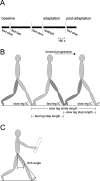Cerebellar contributions to locomotor adaptations during splitbelt treadmill walking
- PMID: 16957067
- PMCID: PMC6674518
- DOI: 10.1523/JNEUROSCI.2622-06.2006
Cerebellar contributions to locomotor adaptations during splitbelt treadmill walking
Abstract
Locomotor adaptability ranges from the simple and fast-acting to the complex and long-lasting and is a requirement for successful mobility in an unpredictable environment. Several neural structures, including the spinal cord, brainstem, cerebellum, and motor cortex, have been implicated in the control of various types of locomotor adaptation. However, it is not known which structures control which types of adaptation and the specific mechanisms by which the appropriate adjustments are made. Here, we used a splitbelt treadmill to test cerebellar contributions to two different forms of locomotor adaptation in humans. We found that cerebellar damage does not impair the ability to make reactive feedback-driven motor adaptations, but significantly disrupts predictive feedforward motor adaptations during splitbelt treadmill locomotion. Our results speak to two important aspects of locomotor control. First, we have demonstrated that different levels of locomotor adaptability are clearly dissociable. Second, the cerebellum seems to play an essential role in predictive but not reactive locomotor adjustments. We postulate that reactive adjustments may instead be predominantly controlled by lower neural centers, such as the spinal cord or brainstem.
Figures





References
-
- Allen GL, Tsukahara N. Cerebrocerebellar communication systems. Physiol Rev. 1974;54:957–1006. - PubMed
-
- Armstrong DM. Supraspinal contributions to the initiation and control of locomotion in the cat. Prog Neurobiol. 1986;26:273–361. - PubMed
-
- Arshavsky YI, Orlovsky GN, Panchin YV, Roberts A, Soffe SR. Neuronal control of swimming locomotion: analysis of the pteropod mollusc Clione and embryos of the amphibian Xenopus. Trends Neurosci. 1993;16:227–233. - PubMed
-
- Batschelet E. Circular statistics in biology. New York: Academic; 1981.
Publication types
MeSH terms
Grants and funding
LinkOut - more resources
Full Text Sources
Other Literature Sources
Medical
